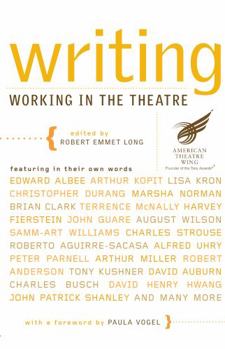Writing: Working in the Theatre
Select Format
Select Condition 
Book Overview
Published to coincide with the 60th anniversary of the Tony Awards(R), the launch of the new Working in the Theatre series from The American Theatre Wing, founder of the Tony Awards(R), promises to be one of the most exciting theatrical-publishing events ever.
For more than 30 years, the Wing has produced the Working in the Theatre seminars, a series that features the greatest names in theatre. In book form for the first time, these compact volumes-at...
Format:Paperback
Language:English
ISBN:0826418074
ISBN13:9780826418074
Release Date:January 2008
Publisher:Bloomsbury Publishing PLC
Length:160 Pages
Weight:0.40 lbs.
Dimensions:0.5" x 5.1" x 7.7"
Customer Reviews
1 rating
Excellent slim book - just the good stuff
Published by Thriftbooks.com User , 14 years ago
This is a slim white book that is purely quotes from master playwrights. The quotes are short -- one line to a half-page long -- with lots of white space. Practical workaday thoughts. It is as if you are sitting there working on your play, and suddenly the fairy godmothers appear and give you blessings: Rosewater. Salt. Green leather boots. For example, from "Starting Out": "PAULA VOGEL I had an older brother who died from AIDS, who was quite brilliant. He was supposed to be the writer in the family: wrote novels, wrote poetry. And you know how, in a family, as siblings, you never do what your older sibling is doing? I started thinking about theatre as not as literary a form as the novel or as a poem. I started telling myself that playwriting was actually not writing, that it was all right to write a play because, basically, I was writing the script -- but that actors and directors would actually be writing the production. So, I wasn't really a writer. I was writing a scenario. I was writing a structure. I was writing an excuse for us all to get together in a room." Or, from "Writing For The Stage": "ROBERT ANDERSON It's usually three years between the time I finish a play and the time it gets on. It's murder. EDWARD ALBEE I keep a play in my head for years before I trust it to the page. I let it evolve. KEITH GLOVER I usually get the title first and I usually run it past my wife and I ask, "What do you think about this?" And she goes, "OK. You can do a little bit better," or something like that. And then, I try to live up to the title. THERESA REBECK Sometimes, I'll see someone in an orange sweater and think, "Oh, a person in an orange sweater. Her name might be this." It's the mystery of where ideas come from. NILO CRUZ I usually start with something it could be. It could be just a face, a character, it could be a name. It could be some particular kind of behavior that I'm interested in exploring. So, I never know what the play is going to be about. THERESA REBECK You have to center yourself deep inside the body of the character, so the words can rise out of that. MARSHA NORMAN [Director] Jon Jory said, "I can just tell you the mistakes you don't have to make as a first-time writer." And then, he especially gave me a great piece of advice: "When you're looking for a subject, look to a time in your life when you were terrified -- when you were really frightened, when you were scared, when you were frozen in fear." And that does, indeed, turn out to be a great place to look for subject matter." I recommend this book. Well worth the price. Thanks, playwrights and authors, for the wisdom.




